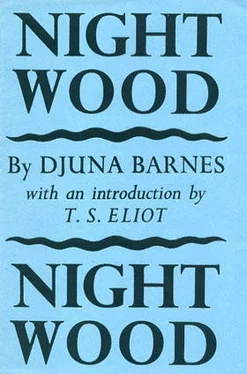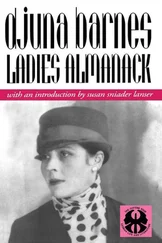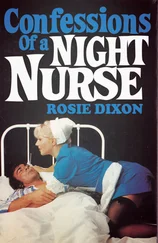The doctor, seeing Nora out walking alone, said to himself, as the tall blackcaped figure passed ahead of him under the lamps, ‘There goes the dismantled—Love has fallen off her wall. A religious woman’, he thought to himself, ‘without the joy and safety of the Catholic faith, which at a pinch covers up the spots on the wall when the family portraits take a slide; take that safety from a woman’, he said to himself, quickening his step to follow her, ‘and love gets loose and into the rafters. She sees her everywhere.’ he added, glancing at Nora as she passed into the dark. ‘Out looking for what she’s afraid to find—Robin. There goes mother of mischief, running about, trying to get the world home.’
Looking at every couple as they passed, into every carriage and car, up to the lighted windows of the houses, trying to discover not Robin any longer, but traces of Robin, influences in her life (and those which were yet to be betrayed), Nora watched every moving figure for some gesture that might turn up in the movements made by Robin; avoiding the quarter where she knew her to be, where by her own movements the waiters, the people on the terraces might know that she had a part in Robin’s life.
Returning home, the interminable night would begin. Listening to the faint sounds from the street, every murmur from the garden, an unevolved and tiny hum that spoke of the progressive growth of noise that would be Robin coming home, Nora lay and beat her pillow without force, unable to cry, her legs drawn up. At times she would get up and walk, to make something in her life outside more quickly over; to bring Robin back by the very velocity of the beating of her heart. And walking in vain, suddenly she would sit down on one of the circus chairs that stood by the long window overlooking the garden, bend forward, putting her hands between her legs, and begin to cry ‘Oh God! Oh God! Oh God!’ repeated so often that it had the effect of all words spoken in vain. She nodded and awoke again and began to cry before she opened her eyes, and went back to the bed and fell into a dream which she recognized; though in the finality of this version she knew that the dream had not been ‘well dreamt’ before. Where the dream had been incalculable, it was now completed with the entry of Robin.
Nora dreamed that she was standing at the top of a house, that is, the last floor but one—this was her Grandmother’s room—an expansive, decaying splendour; yet somehow, though set with all the belongings of her grandmother, was as bereft as the nest of a bird which will not return. Portraits of her great-uncle, Llewellyn, who died in the Civil War, faded pale carpets, curtains that resembled columns from their time in stillness—a plume and an ink well—the ink faded into the quill; standing, Nora looked down into the body of the house, as if from a scaffold, where now Robin had entered the dream, lying among a company below. Nora said to herself, ‘The dream will not be dreamed again.’ A disc of light, that seemed to come from someone or thing standing behind her and which was yet a shadow, shed a faintly luminous glow upon the upturned, still face of Robin who had the smile of an ‘only survivor’, a smile which fear had married to the bone.
From round about her in anguish Nora heard her own voice saying, ‘Come up, this is Grandmother’s room,’ yet knowing it was impossible, because the room was taboo. The louder she cried out the farther away went the floor below, as if Robin and she, in their extremity, were a pair of opera glasses turned to the wrong end, diminishing in their painful love; a speed that ran away with the two ends of the building, stretching her apart.
This dream that now had all its parts, had still the former quality of never really having been her grandmother’s room. She herself did not seem to be there in person, nor able to give an invitation. She had wanted to put her hands on something in this room to prove it; the dream had never permitted her to do so. This chamber that had never been her grandmother’s, which was, on the contrary, the absolute opposite of any known room her grandmother had ever moved or lived in, was nevertheless saturated with the lost presence of her grandmother, who seemed in the continual process of leaving it. The architecture of dream had rebuilt her everlasting and continuous, flowing away in a long gown of soft folds and chin laces, the pinched gatherings that composed the train taking an upward line over the back and hips, in a curve that not only bent age but fear of bent age demands.
With this figure of her grandmother who was not entirely her recalled grandmother, went one of her childhood, when she had run into her at the corner of the house—the grandmother who, for some unknown reason, was dressed as a man, wearing a billycock and a corked moustache, ridiculous and plump in tight trousers and a red waistcoat, her arms spread saying with a leer of love, ‘My little sweetheart’—her grandmother ‘drawn upon’ as a prehistoric ruin is drawn upon, symbolizing her life out of her life, and which now appeared to Nora as something being done to Robin, Robin disfigured and eternalized by the hieroglyphics of sleep and pain.
Waking she began to walk again, and looking out into the garden in the faint light of dawn, she saw a double shadow falling from the statue, as if it were multiplying, and thinking perhaps this was Robin, she called and was not answered. Standing motionless, straining her eyes, she saw emerge from the darkness the light of Robin’s eyes, the fear in them developing their luminosity until, by the intensity of their double regard, Robin’s eyes and her’s met. So they gazed at each other. As if that light had power to bring what was dreaded into the zone of their catastrophe, Nora saw the body of another woman swim up into the statue’s obscurity, with head hung down, that the added eyes might not augment the illumination; her arms about Robin’s neck, her body pressed to Robin’s, her legs slackened in the hang of the embrace.
Unable to turn her eyes away, incapable of speech, experiencing a sensation of evil, complete and dismembering, Nora fell to her knees, so that her eyes were not withdrawn by her volition, but dropped from their orbit by the falling of her body. Her chin on the sill she knelt thinking, ‘Now they will not hold together,’ feeling that if she turned away from what Robin was doing, the design would break and melt back into Robin alone. She closed her eyes, and at that moment she knew an awful happiness. Robin, like something dormant, was protected, moved out of death’s way by the successive arms of women; but as she closed her eyes, Nora said ‘Ah!’ with the intolerable automatism of the last ‘Ah!’ in a body struck at the moment of its final breath.
CHAPTER FOUR
The Squatter
Jenny Petherbridge was a widow, a middle-aged woman who had been married four times. Each husband had wasted away and died; she had been like a squirrel racing a wheel day and night in an endeavour to make them historical; they could not survive it.
She had a beaked head and the body, small, feeble, and ferocious, that somehow made one associate her with Judy; they did not go together. Only severed could any part of her have been called ‘right’. There was a trembling ardour in her wrists and fingers as if she were suffering from some elaborate denial. She looked old, yet expectant of age; she seemed to be steaming in the vapours of someone else about to die; still she gave off an odour to the mind (for there are purely mental smells that have no reality) of a woman about to be accouchée. Her body suffered from its fare, laughter and crumbs, abuse and indulgence. But put out a hand to touch her, and her head moved perceptibly with the broken arc of two instincts, recoil and advance, so that the head rocked timidly and aggressively at the same moment, giving her a slightly shuddering and expectant rhythm.
Читать дальше












